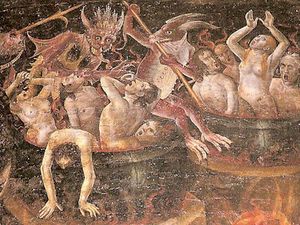Faith

The word for faith today can be defined as:
"Faith is confidence or trust in a person or thing; or the observance of an obligation from loyalty; or fidelity to a person, promise, engagement; or a belief not based on proof; or it may refer to a particular system of religious belief."
The English word faith appeared around 1200 AD from the Middle English feith, via Anglo-French fed. It is probably from Latin fidem and the accusative of fidēs meaning trust and fīdere meaning to trust.
The Greek word for faith (pistis) was not merely what you think nor believe, but it was the compelling conviction of the truth that controlled your actions, which means of course if your deeds, e.g. your fruits, are not what should be expected then that faith is not true faith.[1]
Pistis (Πίστις) did not just mean you believed something to be true, but it was the personification of good faith, trust and reliability. Greek rhetoric and Christian faith share the concepts of faith (pistis). So from the Greek point of view pistis or faith by its nature produced good or good works. It included the concept of probity which was synonymous with integrity, rectitude; uprightness; honesty, faith, honor.
Two hundred years ago, the English word faith was defined as “Probity; good faith is the very soul of contracts. Faith also signifies confidence, belief; as, full faith and credit ought to be given to the acts of a magistrate while acting within his jurisdiction. Vide Bona fide.”

We see that faith is defined as probity. Probity was defined as: “Justice, honesty. A man of probity is one who loves justice and honesty, and who dislikes the contrary.”
The fruits of true faith is "probity" was defined as: “Justice, honesty.” Faith in Christ will compel us to seek the kingdom of God and produce the righteousness of God to be seen in the actions of Christians. If the fruits of true faith draws us to good works and compels us away from being workers of iniquity, then Modern Christians would not be engaging in covetous practices but practicing pure Religion like the early Church.
Understanding that religion and faith are simply the performance of duty to God and your fellow men—and NOT just what you think—overturns many of the modern religious doctrines. It also brings the nature of modern government and its politics into a new light and understanding. Understanding the Imperial Cult of Rome and the Christian conflict with Rome can bring a fuller understanding of the Faith of early Christians and what Baptism meant and how it changed their lives.

There are many people who say they have faith in Jesus who was the Christ, but for that to be true they would have to know the real Jesus Christ. If they did believe in the real Jesus, they would find themselves compelled to adhere to the Doctrines of Jesus by that faith. If we are not doing what Christ said to do or if we are doing what he said made the word of God to none effect, then the truth of our assumed faith comes into question and we may have need of repentance.
That trust in Jesus would include love of Him and The Way he taught His Disciples. And if you loved Him, you would be compelled by that love and faith to Keep the Commandments. Your society and community would become truly free, and it would be void of the elements of the world and the bondage of Egypt. You would not become merchandise as predicted by Peter, nor would you become a surety for debt nor would you curse children with that debt, in your own wantonness and sloth.
Real faith compels virtue by controlling what you do in matters of justice and honor.
Real faith causes you to keep the commandments and not covet your neighbor's goods.
Real faith is our allegiance to what was called The Way. You are only a real Christian if you have repented and are following Christ and His Way, and if you are a Doer of His word. Otherwise your faith is a lie.
People who do not live by faith in Christ and His Way often live by force, biting one another.
People who do not live by faith often live by socialism and other Covetous Practices:
- "Behold, his soul which is lifted up is not upright in him: but the just shall live by his faith." (Habakkuk 2:4)
- "For therein is the righteousness of God revealed from faith to faith: as it is written, The just shall live by faith." (Romans 1:17)
- "But that no man is justified by the law in the sight of God, it is evident: for, The just shall live by faith." (Galatians 3:11)
- "Now the just shall live by faith: but if any man draw back, my soul shall have no pleasure in him." (Hebrews 10:38)
That Word You Use - Part 2 - Faith
What did the word Faith mean before it became just what people think?
http://www.hisholychurch.org/news/articles/ThatWord2nwv.php
Chapter 14. of the book The Covenants of the gods
Trust vs Faith
Audio http://keysofthekingdom.info/COG-14.mp3
Text http://www.hisholychurch.org/study/gods/cog14tvf.php
See more Forbidden Definitions
References
<references>
- ↑ Matthew 7:16 “Ye shall know them by their fruits. Do men gather grapes of thorns, or figs of thistles?”
Matthew 7:20 “Wherefore by their fruits ye shall know them.”